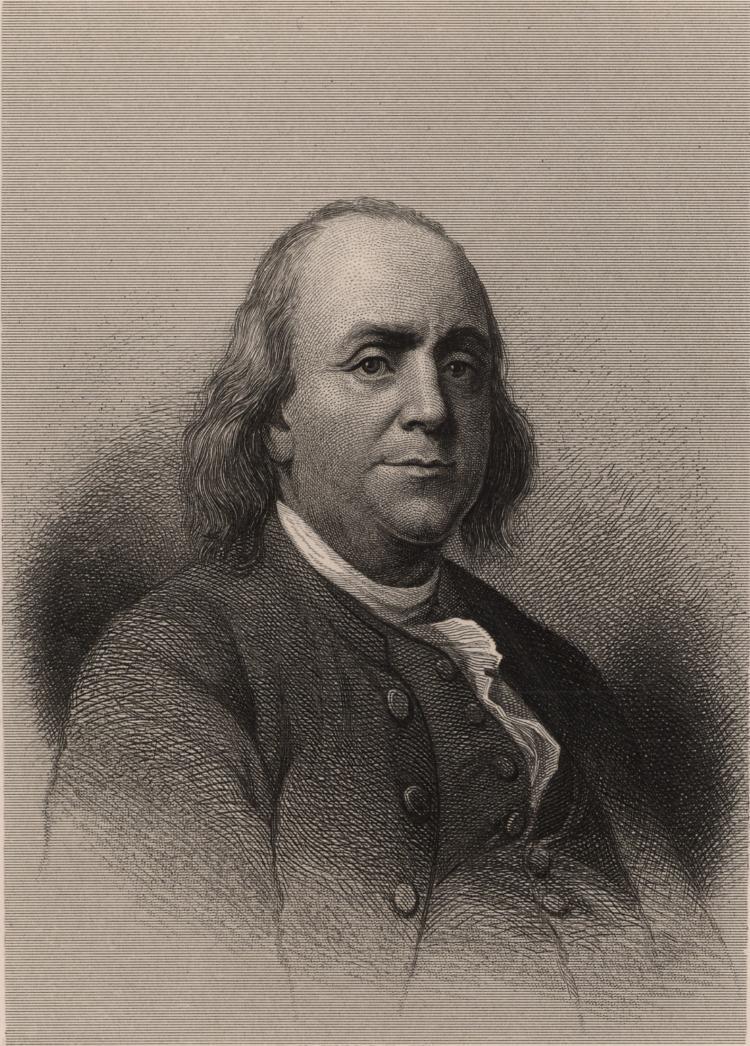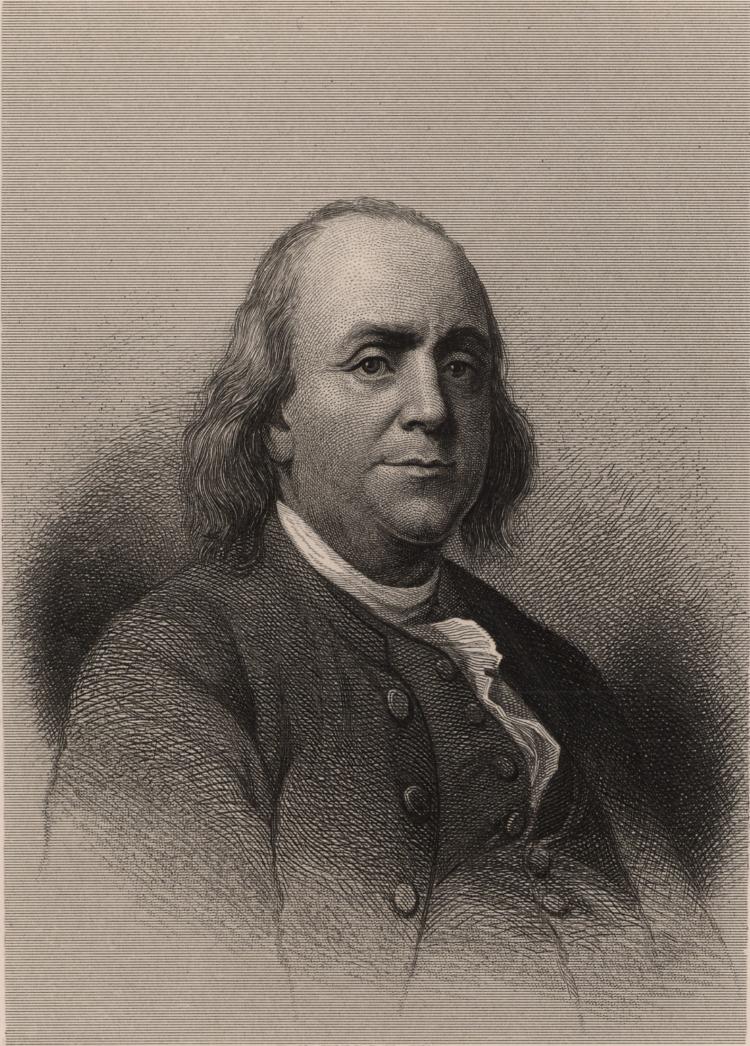When Benjamin Franklin was 20 years old he began documenting when he would fail to behave according to the standard he had set for himself. These standards were comprised of 13 virtues. He carried out the practice of documenting his behavior for the rest of his life, which he later publicized in writing (when he was 79 years old). Many are inspired by this great inventor’s ability to map and plan out his goal toward self-mastery.
The 13 virtues, as he wrote them, were:
1. Temperance: Eat not to dullness and drink not to elevation.
2. Silence: Speak not but what may benefit others or yourself. Avoid trifling conversation.
3. Order: Let all your things have their places. Let each part of your business have its time.
4. Resolution: Resolve to perform what you ought. Perform without fail what you resolve.
5. Frugality: Make no expense but to do good to others or yourself: i.e. Waste nothing.
6. Industry: Lose no time. Be always employed in something useful. Cut off all unnecessary actions.
7. Sincerity: Use no hurtful deceit. Think innocently and justly; and, if you speak, speak accordingly.
8. Justice: Wrong none, by doing injuries or omitting the benefits that are your duty.
9. Moderation: Avoid extremes. Forebear resenting injuries so much as you think they deserve.
10. Cleanliness: Tolerate no uncleanness in body, clothes, or habitation.
11. Chastity: Rarely use venery but for health or offspring; Never to dullness, weakness, or the injury of your own or another’s peace or reputation.
12. Tranquility: Be not disturbed at trifles, or at accidents common or unavoidable.
13. Humility: Imitate Jesus and Socrates.
Benjamin Franklin’s tracking plan was carefully mapped out so that he could focus on one virtue per week. Since there were 13 virtues it would take him 13 weeks to get through all virtues. At the end of 13 weeks he would start from the beginning again. This worked out so that he was able to track each virtue four times per year.
At the start of this plan, his charts were filled with dots that he would place under each day that he did not accomplish his behavioral goal. As time went on, however, Franklin improved and his charts became more and more free of dots.
According to traditional Chinese philosophies, one will not be healthy without improving the mind and heart. We all could make resolutions to improve our financial situation, and physical looks, and personal wellness until we are blue in the face, but without making fundamental changes in our hearts and minds, we will get nowhere.
If that is the case, then perhaps this year we can begin to think about what it really is that we need to resolve to do. We are facing sweeping economic crises, a spreading of disease epidemics from H1N1 to obesity, and chronic terrorist attacks. We have to ask ourselves what is really important? Perhaps three out of four people fail to keep their New Year’s resolutions because they are not digging deep enough. Once one is moved to change for other’s wellbeing rather than their own, or to change based on principal rather than emotion and desire, one may actually be able to follow through with improvement each step of the way until their last day.
The 13 virtues, as he wrote them, were:
1. Temperance: Eat not to dullness and drink not to elevation.
2. Silence: Speak not but what may benefit others or yourself. Avoid trifling conversation.
3. Order: Let all your things have their places. Let each part of your business have its time.
4. Resolution: Resolve to perform what you ought. Perform without fail what you resolve.
5. Frugality: Make no expense but to do good to others or yourself: i.e. Waste nothing.
6. Industry: Lose no time. Be always employed in something useful. Cut off all unnecessary actions.
7. Sincerity: Use no hurtful deceit. Think innocently and justly; and, if you speak, speak accordingly.
8. Justice: Wrong none, by doing injuries or omitting the benefits that are your duty.
9. Moderation: Avoid extremes. Forebear resenting injuries so much as you think they deserve.
10. Cleanliness: Tolerate no uncleanness in body, clothes, or habitation.
11. Chastity: Rarely use venery but for health or offspring; Never to dullness, weakness, or the injury of your own or another’s peace or reputation.
12. Tranquility: Be not disturbed at trifles, or at accidents common or unavoidable.
13. Humility: Imitate Jesus and Socrates.
Benjamin Franklin’s tracking plan was carefully mapped out so that he could focus on one virtue per week. Since there were 13 virtues it would take him 13 weeks to get through all virtues. At the end of 13 weeks he would start from the beginning again. This worked out so that he was able to track each virtue four times per year.
At the start of this plan, his charts were filled with dots that he would place under each day that he did not accomplish his behavioral goal. As time went on, however, Franklin improved and his charts became more and more free of dots.
According to traditional Chinese philosophies, one will not be healthy without improving the mind and heart. We all could make resolutions to improve our financial situation, and physical looks, and personal wellness until we are blue in the face, but without making fundamental changes in our hearts and minds, we will get nowhere.
If that is the case, then perhaps this year we can begin to think about what it really is that we need to resolve to do. We are facing sweeping economic crises, a spreading of disease epidemics from H1N1 to obesity, and chronic terrorist attacks. We have to ask ourselves what is really important? Perhaps three out of four people fail to keep their New Year’s resolutions because they are not digging deep enough. Once one is moved to change for other’s wellbeing rather than their own, or to change based on principal rather than emotion and desire, one may actually be able to follow through with improvement each step of the way until their last day.







